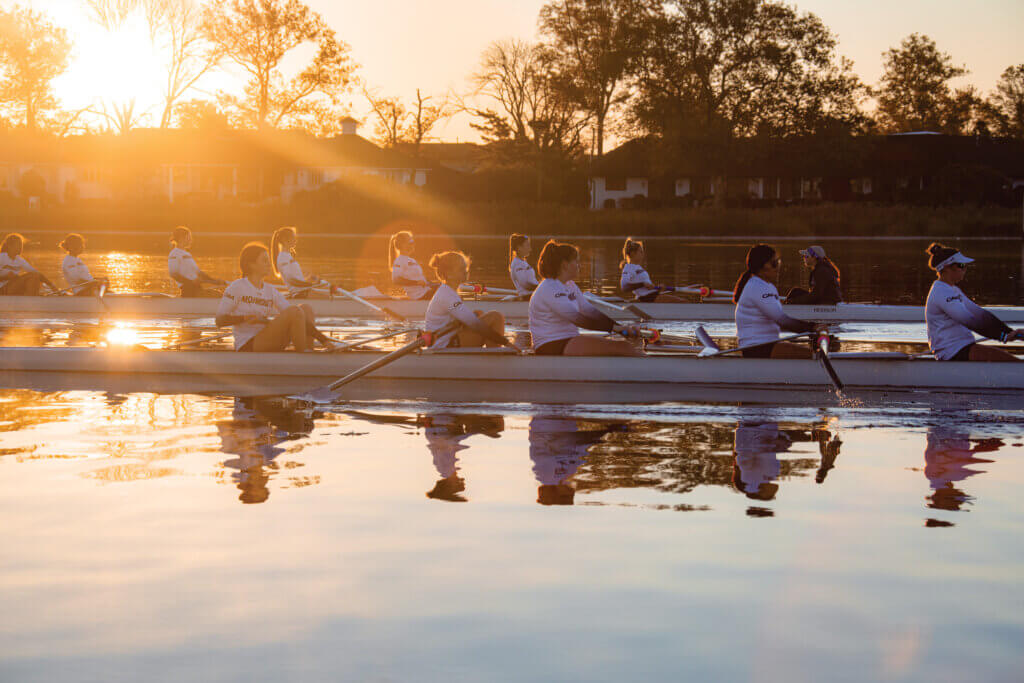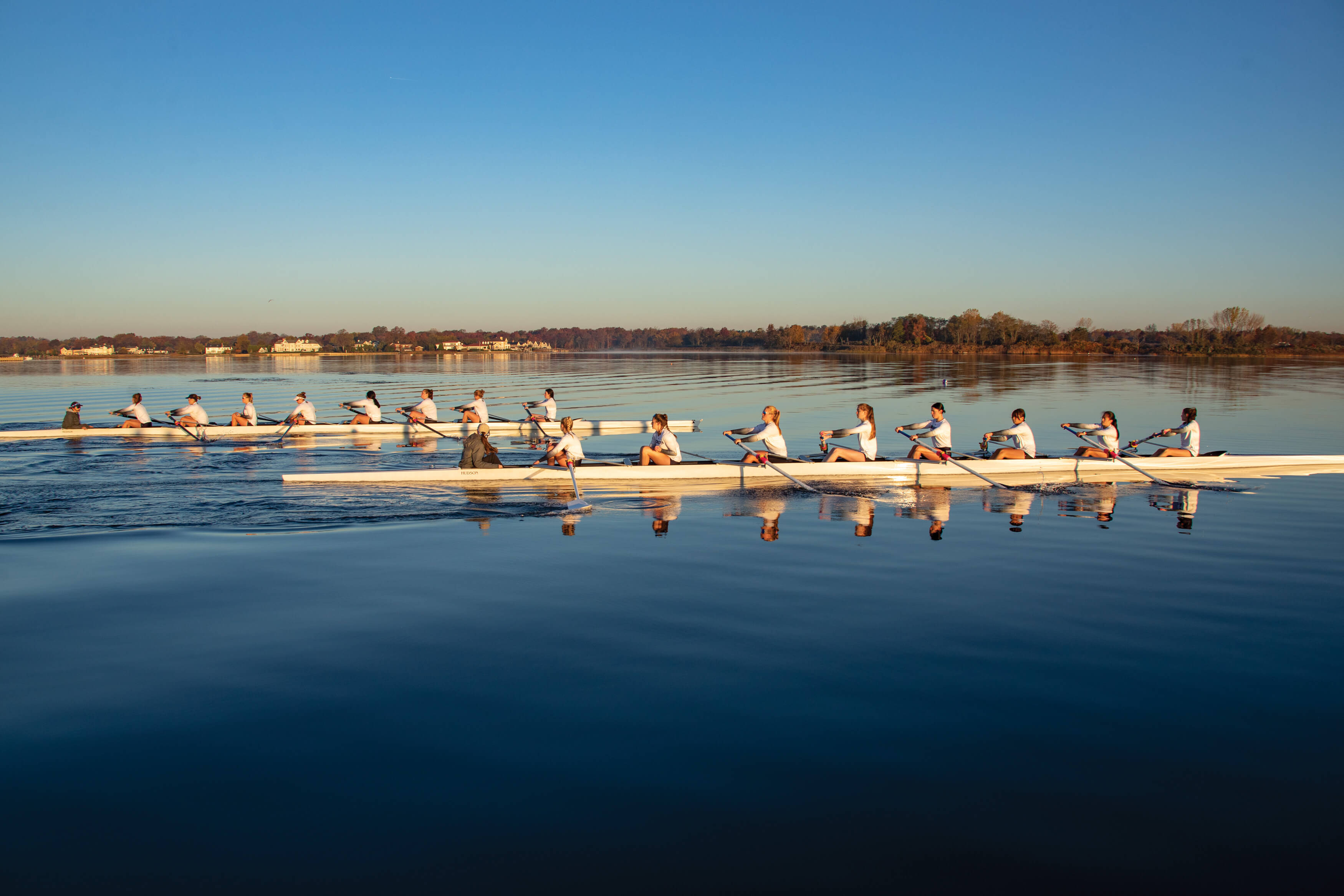
Catching Up with the New Crew
Just a year after its inception, the women’s rowing program took to the water last fall in historic fashion.
Caitlin Newsome walked on to the Monmouth rowing team with what could charitably be described as limited experience.
“I had actually never rowed before,” Newsome says with a laugh. “I’d been on camping trips where I had canoed, but I realized pretty quickly that that’s a very different thing.”
A complete lack of relevant experience would be disqualifying for a roster spot in most Division I sports, but not in rowing. And like many of her teammates, Newsome brought other qualities that made her a great fit. An accomplished athlete before arriving at Monmouth, she appreciates the value of practice and discipline, thrives on competition, and relishes the chance to improve in measurable ways. She also had good timing: The Hawks, in the program’s first year of existence, had a roster to fill.
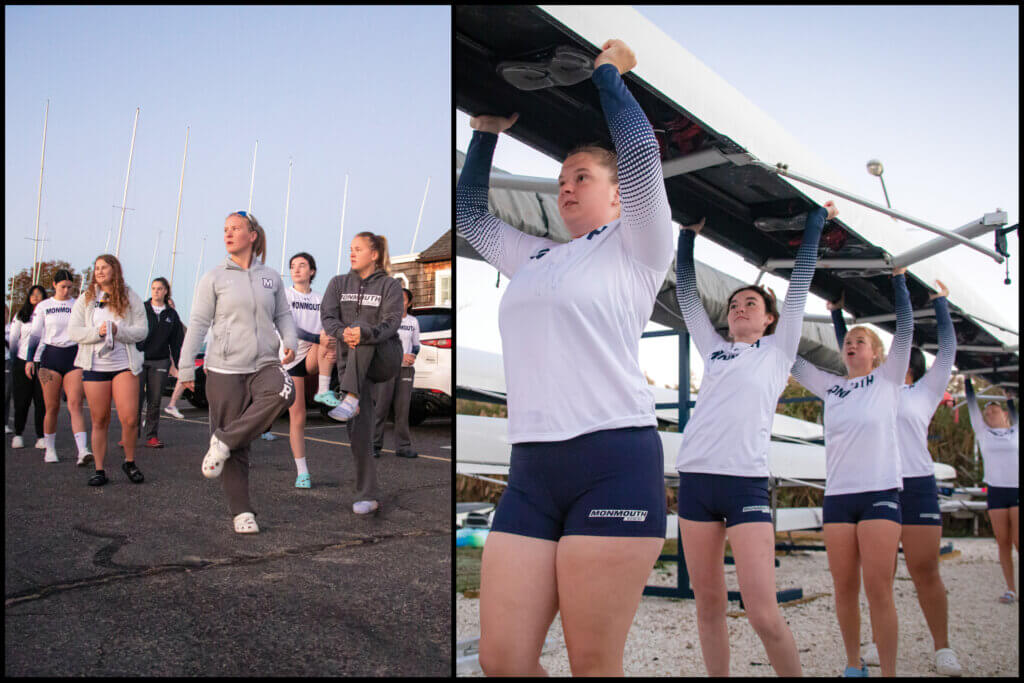
In fact, about half of the student-athletes on Monmouth’s inaugural rowing team followed a path similar to Newsome’s: standout high school athletes, many who dealt with injuries, open to a new challenge and not scared off by pre-dawn practice sessions. The other half were seasoned high school rowers drawn by the offer of scholarships and the chance to be trailblazers. Led by an experienced coaching staff and enthusiastically backed by the University, the team hit the water this fall with realistic expectations for the short term—and big ambitions for the future.
“The challenge of starting an NCAA Division I program from scratch, with no club team or existing infrastructure—there were definitely times last year where I was sitting at my desk thinking, What did I get myself into?” says Head Coach Scott Belford, who was hired in September 2021. “But the support from the University has been tremendous, and now we’re getting recognition from around the sport. People see that Monmouth’s here to stay.”
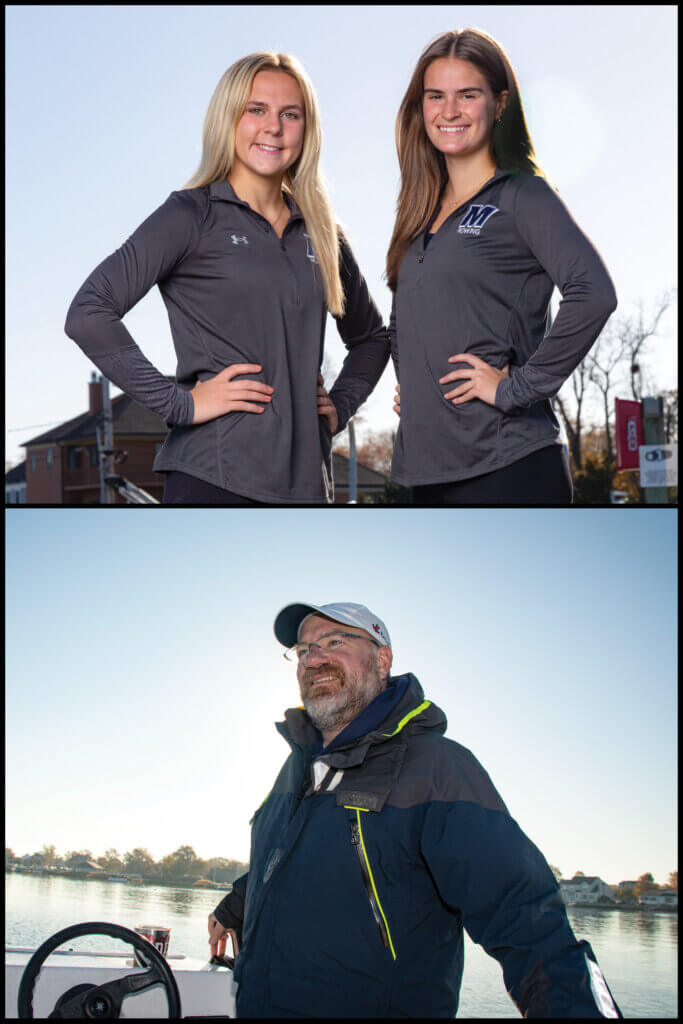
Using the success of the Hawks’ athletic programs to enhance Monmouth’s national name recognition was a stated goal in the University’s five-year strategic plan, Excellence. Access. Ambition., which was launched in 2021. That goal applied to existing sports, of course, but also to sports the University might someday add. Considering those possibilities meant considering potential barriers to entry, including cost, Title IX compliance, and the opportunity to be competitive; by all those measures, women’s rowing made a lot of sense. It didn’t hurt that President Patrick F. Leahy, a collegiate rower during his undergraduate days at Georgetown, had a firsthand appreciation for the sport.
And then there’s the water. “We’re in a really unique area—there are rivers all around us,” says Athletic Director Jeff Stapleton. An agreement with the Shrewsbury Sailing & Yacht Club, about 10 minutes from campus, provided Monmouth with a perfect place to launch its boats—and the program.
Once the University was committed to the sport, there was no more vital decision than hiring the right head coach. In that search, Belford checked every box. He was born in Elizabeth, New Jersey, and grew up in Monmouth County, where he was a good enough high school soccer player to walk on at Rutgers. Not long after a knee injury derailed his hopes of playing in college, he was walking past a row of student activity tables when someone asked him, “Did you play a sport in high school? And are you playing it here?”
Belford said he wasn’t. “Show up at the boathouse Monday morning,” came the reply.
“So I did,” he says. “And I was absolutely hooked.”
Belford rowed for four years and eventually captained the team, and he has dedicated much of his life since to coaching the sport—from the club team at William & Mary to assistant gigs at Princeton and Penn and stints at rowing clubs and with the U.S. junior national team. In 2003, a college teammate called and asked if he’d be interested in helping to start a rowing team at Christian Brothers Academy (CBA) in Lincroft, New Jersey. Belford said yes. He ended up leading a nationally competitive high school program for the next 18 years.
“I always said the only way I’d leave CBA was if a suitable position came open at Rutgers,” Belford says, “or if Monmouth started women’s rowing.” When he saw the position advertised in the summer of 2021, Belford says his wife looked at him and said, “This is meant to be.”
Stapleton has no doubt the University nailed the hire. “Scott is a passionate guy, and I think we’ve been very lucky to have him help start our program,” the athletics director says. “He’ll go up to students around campus and say, ‘Hey have you ever rowed? Why don’t you come down and try it.’ And he’ll get them in a boat.”
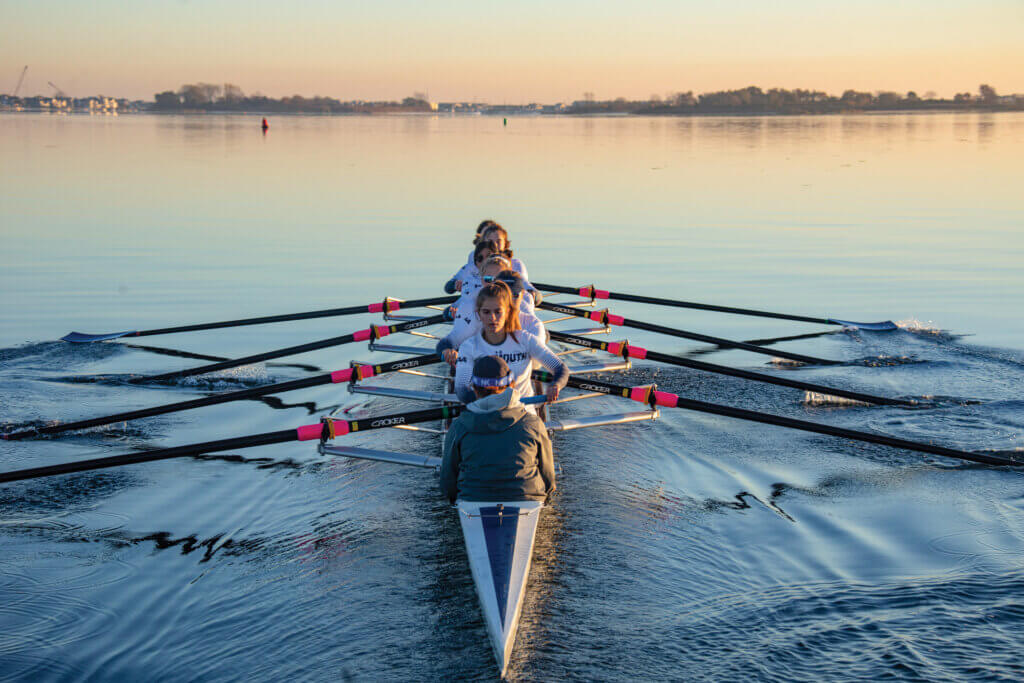
Drawn by the University’s commitment to building a competitive program, Belford spent his first year on the job doing everything but competing. With no staff and no roster, he focused on purchasing equipment—six Hudson racing boats and a couple of chase boats for the coaches—figuring out logistics, and getting the word out that Monmouth would have boats in the water the following year. “Initially, people just didn’t know we were here,” he says. “I did a lot of reaching out, sat in on a lot of high school practices. It was just getting the word out, letting people know we’re here and we mean business.”
The first class includes 20 athletes, split between walk-ons like Newsome (most are first-year students and none had rowed competitively before they arrived on campus) and experienced high school rowers like Kaitlyn Rice of Egg Harbor Township, New Jersey, to whom the Hawks could offer scholarships. Rice’s high school resume includes a gold medal in women’s single sculls at the Atlantic County Championship and a seat in the novice eight boat that was named Atlantic City Press Boat of the Year—not to mention National Honor Society membership. In other words, she’s exactly the type of student-athlete Belford was thrilled to recruit.
The team’s first meeting last September emphasized the newness of the entire endeavor. “We didn’t have any upperclassmen to show us the ropes, so we were all kind of hesitant at first to really jump into it,” Rice says. “But once we started to get to know each other, we helped each other get through the hard workouts or helped each other with homework, and we all kind of bonded over that.”
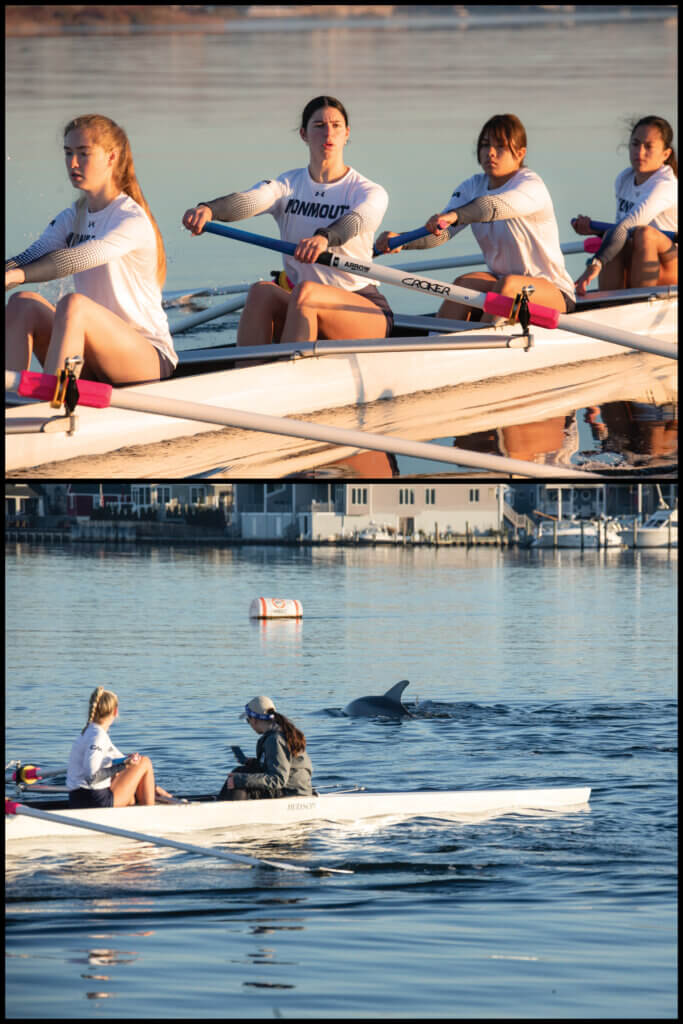
About those workouts: “You’ll be in the best shape of your life,” Belford says with a laugh. It’s part of his recruiting pitch, but also a warning to the novice rowers that they’re in for some serious work. The newbies started on rowing machines before they got into the boats—they race in teams of four and eight—where they discovered the challenge went beyond mere physical exertion. Newsome, a three-sport standout in high school who ran cross-country at a small college in Vermont as a first-year student before injuries forced her to hang up her spikes, says she quickly learned that “it’s not just about speed or how hard you paddle. It’s a mix of form, keeping the boat centered and balanced, timing, and working together as a team.”
“It’s the ultimate team sport,” Belford says. “You can’t get anywhere without all the people in the boat working together.”
The Hawks—whose early-morning practice runs on the Shrewsbury have occasionally been joined by dolphins racing alongside their boats—have come together more quickly than even their coach dared hope. Monmouth raced for the first time in October, running three boats against a small field of other freshman teams at the Navy Day Regatta in Philadelphia. That they posted middle-of-the-pack finishes did nothing to diminish what Belford called a “historic day for the program. I can’t wait to see where they go from here.”
He got an answer two weeks later, when the Hawks returned to Philly for the prestigious Head of the Schuylkill Regatta. Competing against a much deeper field, Monmouth made history again, finishing third out of 22 boats in the freshman fours race and third out of 16 boats in the freshman eights to clinch the program’s first medals.
Looking back on the performance a week later, Belford said, “I thought we would be competitive, but I would be lying if I said I expected us to have the performances we’ve had. I knew we had a good group that I felt was going to come in, work hard, and establish the right culture, and I knew we had a bunch of individuals poised to grow athletically. But the finishes we’ve had so far … I just didn’t think we’d have these kinds of performances right away.”
Belford acknowledges that the Hawks have a long way to go to turn strong finishes against regional competition into true national relevance. Well-funded programs at universities like Stanford, Texas, Ohio State, Washington, and Cal have dominated the sport over the past decade, and Monmouth—which won’t have a full four-year roster until 2026—won’t catch them overnight. But the coach has a plan to make up the gap.
It starts with expanding the Hawks’ recruiting base. Only four members of the inaugural roster hail from outside New Jersey, but early signees for Belford’s second class include athletes from California, Pittsburgh, and British Columbia. The goal is to build a program that can regularly attract national and even international recruits.
From there, it’s a question of climbing the ladder: The Hawks compete in the Colonial Athletic Association (CAA), in which Northeastern and Drexel are the current powers. “Our hope is that once we’re big enough to field a full NCAA squad, by year four we can start knocking off CAA opponents and be relevant in the conference championships,” Belford says.
It’s an ambitious goal, one that will require hard work, patience, and resilience— some of the same qualities required of the athletes themselves. This first class of Monmouth rowers will be gone by the time the program can enjoy the full fruits of their efforts, but there’s a shared sense of pride in their status as trailblazers that makes the hard work and pre-dawn practices worthwhile. They know they’re part of history—even the ones who’d never held an oar before they joined the team.
